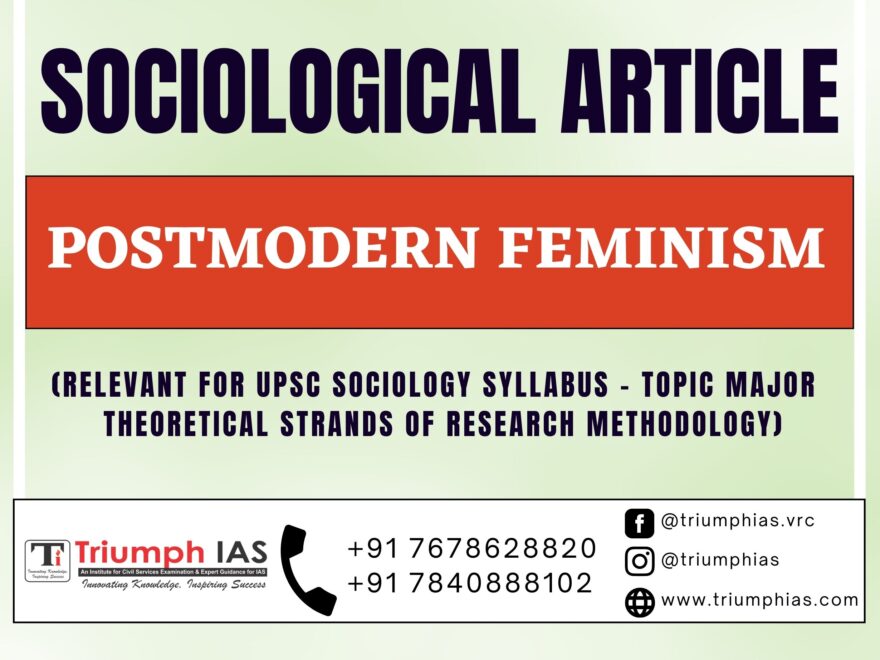
Relevant for UPSC Sociology Syllabus – Topic Major Theoretical Strands of Research Methodology
Feminism has been a powerful force in shaping society’s views on gender equality, challenging stereotypes, and advocating for women’s rights. However, postmodern feminism takes this a step further by questioning the very foundation of feminist theory, arguing that gender is not a fixed category but a social construct that varies across cultures and time. This blog will provide a brief overview of postmodern feminism, its core ideas, and the implications of its approach.
The Origins of Postmodern Feminism
Postmodern feminism emerged in the 1980s as a reaction to the limitations of second-wave feminism, which focused on women’s liberation and sought to establish a universal identity for women based on shared experiences of oppression. Postmodern feminists, on the other hand, argued that the idea of a universal, essentialized womanhood was problematic, as it ignored the diversity of women’s experiences and perspectives.
Postmodern feminism drew inspiration from postmodern philosophy, which emphasized the contingency and multiplicity of meaning. According to postmodern philosophy, there is no objective truth or fixed meaning, but rather multiple and competing interpretations that are shaped by social, cultural, and historical contexts.
The Core Ideas of Postmodern Feminism
Postmodern feminists reject the idea that gender is a natural and immutable category, arguing instead that it is a social construct that is produced and reproduced through cultural practices, discourses, and institutions. This means that gender norms and expectations are not universal but vary across cultures and time, and are therefore subject to change.
Postmodern feminists also challenge the idea of a unified and essentialized female identity, arguing that women’s experiences and identities are shaped by multiple and intersecting factors, such as race, class, sexuality, and nationality. This means that there is no single feminist agenda or strategy that can address the diversity of women’s experiences and needs.
Instead of seeking to establish a universal identity for women, postmodern feminists advocate for a politics of difference, which recognizes and values the diversity of women’s experiences and perspectives. This means that feminist activism should focus on destabilizing gender norms and categories, rather than on establishing a fixed and universal identity for women.
The Implications of Postmodern Feminism
Postmodern feminism has had a profound impact on feminist theory and activism, challenging the dominant narratives and assumptions of second-wave feminism and opening up new avenues for feminist inquiry and practice.
One of the key implications of postmodern feminism is the recognition of the diversity of women’s experiences and perspectives. This has led to the emergence of intersectional feminism, which seeks
to address the intersecting forms of oppression and privilege that shape women’s lives, such as racism, classism, ableism, and homophobia.
Postmodern feminism has also led to a critical rethinking of feminist methodology, encouraging feminist researchers to question their assumptions and biases, and to adopt more reflexive and self-critical approaches to their work.
However, postmodern feminism has also been criticized for its tendency towards relativism and its rejection of universal values and principles. Critics argue that this can lead to a fragmentation of feminist politics and a lack of clarity and coherence in feminist activism.
Conclusion: Postmodern feminism is a theory that challenges the idea of a universal, essentialized womanhood, arguing that gender is a social construct that varies across time and place. Postmodern feminists advocate for a politics of difference that recognizes and values the diversity of women’s experiences and perspectives, and seek to destabilize gender norms and categories. While postmodern feminism has had a profound impact on feminist theory and activism, it has also been subject to criticism for its relativism and lack of clarity in its political objectives. Nevertheless, postmodern feminism remains a powerful force in shaping contemporary feminist discourse and practice.
-
Follow us :
https://www.instagram.com/triumphias
https://www.youtube.com/c/TriumphIAS
https://t.me/VikashRanjanSociology
Find More Blogs
Scope of the subject and comparison with other social sciences
Changing family structure in India Modernity and social changes in Europe
UPSC Sociology Syllabus, Major Theoretical Strands of Research Methodology, feminism, racism, sexism, ableism, homophobia, Kimberlé Crenshaw, policy, activism, identity politics, class, capitalism, intersectional feminism, social identities, systems of oppression, marginalized communities, privilege,#Sociologyforupsc #sociologyforupscinhindi #sociologyforupscgs1 #sociologyforupscprelims #sociologyforupscinenglish #sociologyforupscmainsinhindi #sociologyforupscoptionalinhindi #sociologyforupscmains #sociologyforupscplaylist #sociologyforupsclecture1 #sociologyforupsccse #sociologyforupscoptional #syllabusofsociologyforupscoptional #bestbookforsociologyforupsc #sociologyoptionalforupscanswerwriting #sociologyoptionalforupscanukumari #sociologyoptionalforupscabhijeet #sociologyoptionalforupscanalysis #sociologyoptionalforupscalllectures #sociologysyllabusforupscanalysis


